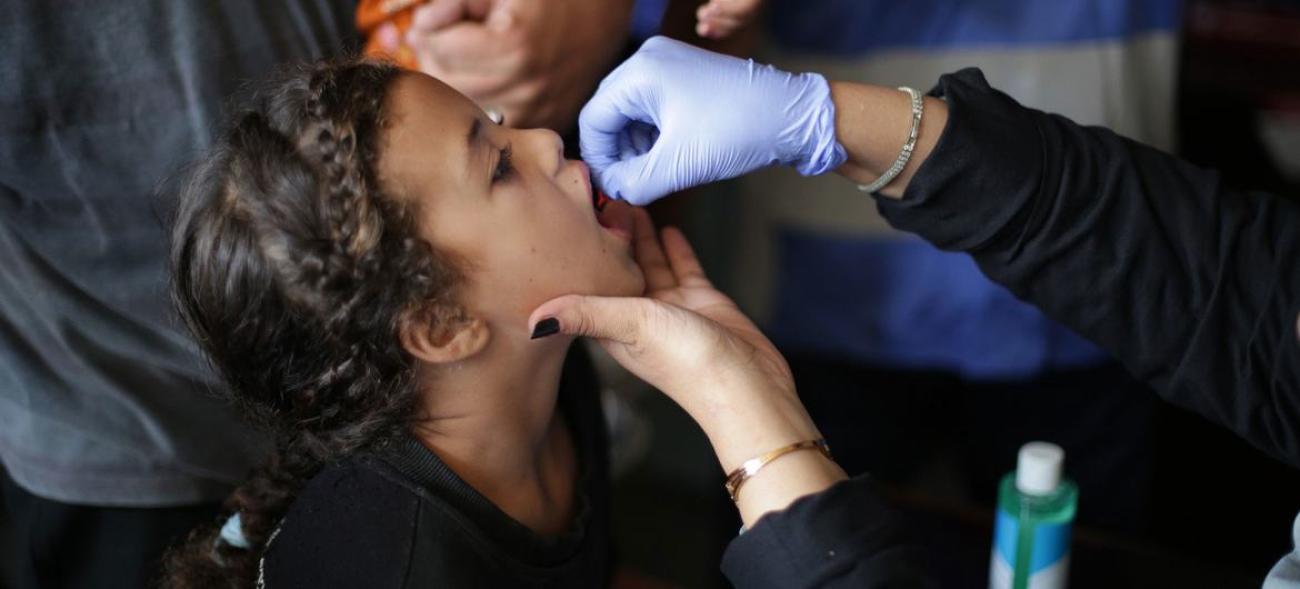Israeli strikes delay polio vaccine campaign in the north

Intense bombardments, mass displacements and lack of access in northern Gaza have forced the postponement of a polio vaccination campaign
The UN health agency said pauses in the bombardment are key.
“Humanitarian pauses are essential for its success, allowing partners to deliver vaccination supplies to health facilities, families to safely access vaccination sites and mobile teams of health workers to reach children in their communities,” WHO said.
But, due to the escalating violence, intense bombardment, mass displacement orders, and lack of assured humanitarian pauses across most of northern Gaza, the Polio Technical Committee for Gaza was forced to postpone the third and final phase of its campaign, which was set to begin today.
In a post on X, the UN Secretary-General António Guterres said he was very concerned about the postponement, saying any outbreak must be contained before any more young lives are destroyed by the virus.
This final phase aimed to vaccinate 119,279 children across northern Gaza, organized by the committee, which includes the Palestinian Ministry of Health, WHO, United Nations Children’s Fund (UNICEF), the UN agency for Palestine refugees (UNRWA) and partners.
Besieged and bombarded
Right now, 400,000 people are trapped in the north, facing Israel Defense Forces (IDF) evacuation orders and constant bombardment in the ongoing year-long war, which began following Hamas-led deadly attacks on Israel and the capture of 250 hostages, more than 100 of which remain in Gaza.
On Tuesday, UNRWA, WHO and other UN agencies asked Israeli authorities for immediate access to deliver lifesaving humanitarian aid.
The UN health agency said the current conditions, including ongoing attacks on civilian infrastructure continue to jeopardise people’s safety and movement in northern Gaza, making it impossible for families to safely bring their children for vaccination, and health workers to operate.
Campaign ready to begin
“It is imperative to stop the polio outbreak as soon as possible, before more children are paralysed and poliovirus spreads further,” WHO said.
“It is crucial therefore that the vaccination campaign in northern Gaza is facilitated through the implementation of the humanitarian pauses, ensuring access for wherever eligible children are located.”
WHO and UNICEF urged all parties to ensure that civilians, health workers, and civilian infrastructure, such as schools, shelters, hospitals, are protected and renew their call for an immediate ceasefire.
To date, all logistics, supplies and trained human resources were prepared to vaccinate children across northern Gaza with a second dose of novel oral polio vaccine type 2 (nOPV2) following a first round conducted across the Gaza Strip from 1 to 12 September 2024.
However, given that the area currently approved for temporary humanitarian pauses was substantially reduced and are now limited only to Gaza City, a significant decrease from the first round, many children in northern Gaza would have missed out on the polio vaccine dose.
Polio returns to Gaza
After eradicating the disease a quarter of a century ago, Gaza reported its first case of polio earlier this year, one of the consequences of the year-long war and besiegement of the Strip, which has seen restricted aid delivery, damage and restrictions for access to critical water and sanitation services and over-crowding in makeshift shelters driven by repeated Israeli evacuation orders.
This prompted a swift response by WHO and partners to unroll a campaign across the devastated Strip.
To interrupt poliovirus transmission and its spread, at least 90 per cent of all children in every community and neighborhood must be vaccinated. Polio causes paralysis and other grave symptoms and can spread rapidly.
A delay in administering a second dose of nOPV2 within six weeks reduces the impact of two closely spaced rounds, decreasing immunity.
Delay could threaten region
Having a significant number of children miss out on their second vaccine dose will seriously jeopardise efforts to stop the transmission of the virus, the UN health agency stressed, adding that it could also lead to further cases in the Gaza Strip and neighbouring countries.
Since the rollout of the second round of the polio campaign in Gaza on 14 October, 442,855 children under age 10 have been successfully vaccinated in Gaza's central and southern areas - 94 per cent of the target in these areas.
A total of 357,802 children between two and 10 received vitamin A supplements as part of efforts to integrate the delivery of polio vaccine with other essential health services in Gaza.

